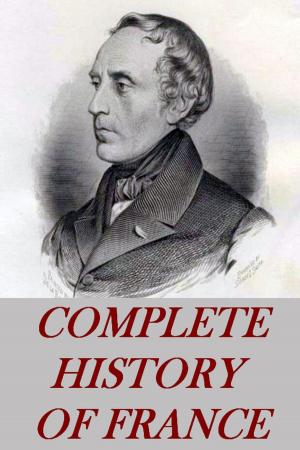| Author: | G. K. Chesterton | ISBN: | 1230000260907 |
| Publisher: | Liongate Press | Publication: | August 17, 2014 |
| Imprint: | Language: | English |
| Author: | G. K. Chesterton |
| ISBN: | 1230000260907 |
| Publisher: | Liongate Press |
| Publication: | August 17, 2014 |
| Imprint: | |
| Language: | English |
This book makes no pretence to be anything but a popular sketch of a great historical character who ought to be more popular. Its aim will be achieved, if it leads those who have hardly even heard of St. Thomas Aquinas to read about him in better books. But from this necessary limitation certain consequences follow, which should perhaps be allowed for from the start.
First, it follows that the tale is told very largely to those who are not of the communion of St. Thomas; and who may be interested in him as I might be in Confucius or Mahomet. Yet, on the other hand, the very need of presenting a clean-cut outline involved its cutting into other outlines of thought, among those who may think differently. If I write a sketch of Nelson mainly for foreigners, I may have to explain elaborately many things that all Englishmen know, and possibly cut out, for brevity, many details that many Englishmen would like to know. But, on the other side, it would be difficult to write a very vivid and moving narrative of Nelson, while entirely concealing the fact that he fought with the French. It would be futile to make a sketch of St. Thomas and conceal the fact that he fought with heretics; and yet the fact itself may embarrass the very purpose for which it is employed. I can only express the hope, and indeed the confidence, that those who regard me as the heretic will hardly blame me for expressing my own convictions, and certainly not for expressing my hero's convictions. There is only one point upon which such a question concerns this very simple narrative. It is the conviction, which I have expressed once or twice in the course of it, that the sixteenth-century schism was really a belated revolt of the thirteenth-century pessimists. It was a back-wash of the old Augustinian Puritanism against the Aristotelian liberality. Without that, I could not place my historical figure in history. But the whole is meant only for a rough sketch of a figure in a landscape and not of a landscape with figures.
Second, it follows that in any such simplification I can hardly say much of the philosopher beyond showing that he had a philosophy. I have only, so to speak, given samples of that philosophy. Lastly, it follows that it is practically impossible to deal adequately with the theology. A lady I know picked up a book of selections from St. Thomas with a commentary; and began hopefully to read a section with the innocent heading, "The Simplicity of God." She then laid down the book with a sigh and said, "Well, if that's His simplicity, I wonder what His complexity is like." With all respect to that excellent Thomistic commentary. I have no desire to have this book laid down, at the very first glance, with a similar sigh. I have taken the view that the biography is an introduction to the philosophy, and that the philosophy is an introduction to the theology; and that I can only carry the reader just beyond the first stage of the story.
Third, I have not thought it necessary to notice those critics who, from time to time, desperately play to the gallery by reprinting paragraphs of medieval demonology in the hope of horrifying the modern public merely by an unfamiliar language. I have taken it for granted that educated men know that Aquinas and all his contemporaries, and all his opponents for centuries after, did believe in demons, and similar facts, but I have not thought them worth mentioning here, for the simple reason that they do not help to detach or distinguish the portrait. In all that, there was no disagreement between Protestant or Catholic theologians, for all the hundreds of years during which there was any theology; and St. Thomas is not notable as holding such views, except in holding them rather mildly. I have not discussed such matters, not because I have any reason to conceal them, but because they do not in any way personally concern the one person whom it is here my business to reveal. There is hardly room, even as it is, for such a figure in such a frame.
This book makes no pretence to be anything but a popular sketch of a great historical character who ought to be more popular. Its aim will be achieved, if it leads those who have hardly even heard of St. Thomas Aquinas to read about him in better books. But from this necessary limitation certain consequences follow, which should perhaps be allowed for from the start.
First, it follows that the tale is told very largely to those who are not of the communion of St. Thomas; and who may be interested in him as I might be in Confucius or Mahomet. Yet, on the other hand, the very need of presenting a clean-cut outline involved its cutting into other outlines of thought, among those who may think differently. If I write a sketch of Nelson mainly for foreigners, I may have to explain elaborately many things that all Englishmen know, and possibly cut out, for brevity, many details that many Englishmen would like to know. But, on the other side, it would be difficult to write a very vivid and moving narrative of Nelson, while entirely concealing the fact that he fought with the French. It would be futile to make a sketch of St. Thomas and conceal the fact that he fought with heretics; and yet the fact itself may embarrass the very purpose for which it is employed. I can only express the hope, and indeed the confidence, that those who regard me as the heretic will hardly blame me for expressing my own convictions, and certainly not for expressing my hero's convictions. There is only one point upon which such a question concerns this very simple narrative. It is the conviction, which I have expressed once or twice in the course of it, that the sixteenth-century schism was really a belated revolt of the thirteenth-century pessimists. It was a back-wash of the old Augustinian Puritanism against the Aristotelian liberality. Without that, I could not place my historical figure in history. But the whole is meant only for a rough sketch of a figure in a landscape and not of a landscape with figures.
Second, it follows that in any such simplification I can hardly say much of the philosopher beyond showing that he had a philosophy. I have only, so to speak, given samples of that philosophy. Lastly, it follows that it is practically impossible to deal adequately with the theology. A lady I know picked up a book of selections from St. Thomas with a commentary; and began hopefully to read a section with the innocent heading, "The Simplicity of God." She then laid down the book with a sigh and said, "Well, if that's His simplicity, I wonder what His complexity is like." With all respect to that excellent Thomistic commentary. I have no desire to have this book laid down, at the very first glance, with a similar sigh. I have taken the view that the biography is an introduction to the philosophy, and that the philosophy is an introduction to the theology; and that I can only carry the reader just beyond the first stage of the story.
Third, I have not thought it necessary to notice those critics who, from time to time, desperately play to the gallery by reprinting paragraphs of medieval demonology in the hope of horrifying the modern public merely by an unfamiliar language. I have taken it for granted that educated men know that Aquinas and all his contemporaries, and all his opponents for centuries after, did believe in demons, and similar facts, but I have not thought them worth mentioning here, for the simple reason that they do not help to detach or distinguish the portrait. In all that, there was no disagreement between Protestant or Catholic theologians, for all the hundreds of years during which there was any theology; and St. Thomas is not notable as holding such views, except in holding them rather mildly. I have not discussed such matters, not because I have any reason to conceal them, but because they do not in any way personally concern the one person whom it is here my business to reveal. There is hardly room, even as it is, for such a figure in such a frame.















